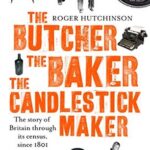 Butcher, Baker and Candlestick Maker received a somewhat lukewarm response from the group. It promised much and was received with great promise when chosen in December. As timing would have it, all seemed to have taken advantage of the extra time afforded to make it through the book and it benefited from being over Christmas where such a luxury was possible.
Butcher, Baker and Candlestick Maker received a somewhat lukewarm response from the group. It promised much and was received with great promise when chosen in December. As timing would have it, all seemed to have taken advantage of the extra time afforded to make it through the book and it benefited from being over Christmas where such a luxury was possible.One of the overarching observations related to the general structure of the book, which appeared tightly written for the first few chapters (largely around Rickman and some of the other personages involved in census affairs) was that it lost track of structure over the run of the book and was all over the map as it went on.
Thanks to Fergal for his own comments which I don’t think are too far from the larger consensus.
“I feel it failed me on a few levels; firstly, there was way too much padding-out. The background information was sometimes interminable – the first 10% of the book was a biography of John Rickman and I very nearly packed it in before that finally reached a conclusion. It also had way, way too much in the way of quotes from other sources. A short piece to back up the point is one thing, but reprinting a couple of pages from other books was overkill.I also felt some of the anecdotes, while interesting, were dawn out way too long and lost their relevance to the subject at hand. The mining families piece, including the bigamy and subsequent emigration, was interesting but flogged to death, I felt.Finally, there were times when I felt I was reading an academic journal with the amount of figures being presented together. There was no need for this in the body of the book – if he really wanted to give a detailed breakdown of every single metric, he could have done so with an appendix or two.The idea was a great one, but I just felt it failed to achieve what it promised. Given that I did actually learn from it, I am loathe to say it was a waste of my time.”
It was possibly more interesting for the numerically inclined and yet sometimes, confounding this, the author veered off in later stages on extended anecdotal narratives that verged on distraction.
The book promised to look to the way in which the census reflected the changing shape and composition of British society. It probably did achieve this and larger themes of the rural-urban migration, industrialisation and its impacts on the population were well captured and documented. So the promise was kept in this regard. Additionally, the aspects looking at the logistics of census-taking and the campaign to make this an integral part of bureaucratic practice were a useful context for – and in fact arguably some of the more memorable and valuable parts of the book.
There was a very useful parallel drawn with Bryson’s At Home in terms of attempting to find a structure for such narrative, but despite the author’s clear capabilities he is not as crafty a storyteller as Bryson and as one member stated “I was bored…surely this won’t be a decade by decade recounting of census results … but it was and I found it difficult to keep going.” As it was it never rose to being ‘writerly’.
The nods to Ireland were appreciated but there was a sense that the author was not to keen on spending too much time here in discussion. Although it was able to maintain some level of engagement with the reader, a tendency as it went on to come across as formulaic and repetitive tended to tread heavily threaten to diminish the reader’s patience. Additionally, I had a sense that it had greater resonance when one could connect to the area or people’s being examined (which in itself is no surprise) but this also suggested a degree of parochial approach to the material being presented.
There were many nuggets in it though and the enumeration and distribution of Jedi Knights in British society struck a particular chord.
All in all as Joe said: ” Good but it could have been far better.”
So the scores on the board:
Declan-7.0, Brian C-6.0, Brian M-7.0, Jim-6.5, Mike-4.0, Joe-6.0, Shawn-5.5 and Fergal 4.5 for an average of 5.8.
Our suggestions for the February read are:
Middlesex by Jeffery Eugenides – Jim
Stoner by John Williams – Mike
Ready Player One – Shawn
Paris in Present Tense – Shawn
Breakthrough at Stalingrad – Declan
Manhattan Beach by Jennifer Egan – Brian C
A notable rich set of nominations.
The voting though produced a clear winner and the February Fiction read is:
Middlesex by Jeffery Euginides
